Vegan leather seems like an oxymoron, but animal-free leather alternatives are now so plentiful and sustainable that there’s little reason to keep skinning animals for fashion. Sure, once upon a time, vegan ‘leather’ meant plastic. These days, though, the choices are much more eco-friendly.
Table of Contents
Here are a few thoughts on the problems with leather (animal and alternative) and how to choose an ethical, sustainable leather jacket, followed by my top picks for the best vegan leather jackets.
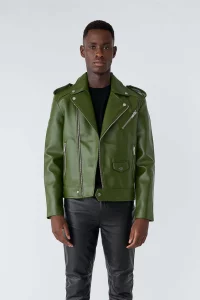
Best cactus leather jacket
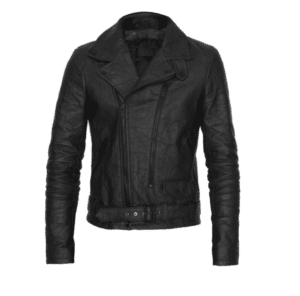
Best pineapple leather jacket
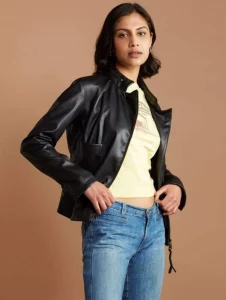
Best recycled vegan leather jacket
What’s wrong with animal leather?
Despite the common refrain, leather isn’t simply a byproduct of the food industry. Leather is a valuable product in its own right, and most of it is untraceable. This means we don’t know how the animals were treated during their short, commodified lives, nor how their skins were treated after death. If you care about the environment, animals, or factory workers, this is a real problem.
Animal skin is biodegradable, but leather isn’t. That’s why manufacturers treat leather with harsh chemicals to prevent it from putrefying (starting to rot). Leather is also often treated with other chemicals such as toxic dyestuffs. These processes are part of why the fashion industry is one of the worst polluters in modern society.
What’s more, the leather industry involves a staggering amount of water, right from rearing animals for slaughter, through to the processing and manufacture of leather goods. Much of this water also ends up contaminated, either with feces or with toxic chemicals, polluting the environment and harming nearby communities.
This is why the majority of leather is still produced in countries without robust environmental standards, putting workers and their families in harms way for the sake of fast fashion.
Finally, because of all those chemical inputs, leather isn’t actually a natural material. It doesn’t biodegrade in landfill, and it is arguably a more toxic product even than plastic leather alternatives, even if vegetable tanned and definitely when tanned using chrome.
Why is vegan leather any better?
For many years, vegan leather was really ‘pleather,’ or plastic leather made with polyvinyl chloride (PVC) and plasticizers, or with polyurethane. These synthetic alternatives degrade quickly, require fossil fuel inputs, and contain a plethora of nasty chemicals. Definitely not sustainable as this means more jackets in landfill, and more pollution and resource use overall.
That said, even a vegan leather jacket made with PVC has a lower environmental footprint than animal leather. And you can recycle a plastic leather jacket at the end of its life, courtesy of TerraCycle.
The best option though (aside from buying second hand) is to choose a vegan leather jacket made with one of the more sustainable modern leather alternatives (see below).
How to choose ethical, sustainable leather
The most sustainable option for fashion is always clothing that already exists. If you can, check out your local thrift stores or clothing swaps first, or ask around to see if any similarly sized friends are having a closet clear out!
Online thrift marketplaces are also a great option if you can’t find what you’d like locally. Check out:
Once you’ve exhausted the secondhand options, look for upcycled jackets made with reclaimed leather, recycled rubber, and other materials. These are typically much less resource-intensive than jackets made with virgin materials. The same goes for jackets made with offcuts or deadstock fabrics that would otherwise be wasted.
If you are buying new, look for a vegan leather jacket made with plant-based leather alternatives like:
- Pineapple skins
- Mushrooms
- Kombucha SCOBYs
- Recycled rubber/polyurethane/nylon/PET
- Cactus leaves
- Cork
- Apple scraps
- Vegea (a grape skin fabric)
- Waxed cotton.
Some plant-based leather fabrics consist of natural materials mixed with polyester. This synthetic fiber is one of the safest options and adds strength, water repellency, and durability without added chemical inputs. By incorporating polyester into natural fibers, manufacturers can create a water-resistant fabric without using per- or polyfluorinated chemicals (PFCs) known as forever chemicals.
It’s also worth noting that current textile technology means that even plant-based leathers almost always have a water-based polyurethane coating to create the leather look. This renders the garments not entirely biodegradable.
Watch out for labeling changes!
If you’re buying from Europe, watch out for changes in labelling practices. The animal leather industry has been busy campaigning to protect the term ‘leather’, making it illegal in Italy and a growing number of countries for anyone to use this word for anything other than animal skin.
A good example of this is how Vegea has to be marketed in Italy as a vegan coated fabric or biomaterial. Vegea is made using grape marc, or the grape skin, stalks, and seeds that make up wine waste. The material is compliant with European regulations (REACH), solvent-free and animal friendly, and is supple, breathable, and highly resistant to abrasion. Like other plant-based leathers, Vegea is coated with water-based polyurethane (WBPU), so isn’t fully biodegradable.
The best vegan leather jackets

Deadwood Men’s River Cactus Leather Jacket
Highlights: The River is Deadwood’s bestselling classic vegan leather men’s jacket made from organically grown cactus! Deadwood’s entire Cactus Collection is organic, vegan, and sustainably made.
Swedish brand Deadwood makes absolutely stunning vegan leather jackets, coats, skirts, bags, and other items using organically grown nopal cactus that can be grown with minimal water inputs. This cruelty-free, sustainable alternative to plastic leather is made without phthalates, PVC, and toxic chemicals.
Interestingly, Deadwood doesn’t specify if its cactus leathers have a water-based polyurethane coating to create the leather look, which would make the jackets not entirely biodegradable. I’ve reached out to the company but haven’t yet had a response.
The cactus leather itself is organic and durable. It is made using cactus sourced from a plantation in Mexico that is free from herbicides and pesticides. The parts of the cactus not used for leather are used in the local food industry, making this a zero-waste material.
The Cactus Collection is certified to OEKO-Tex Standard 100, USDA Organic, and GRS (Global Recycle Standard), as well as PETA approved. Some of the cactus leather items have an R-PET lining made with GRS-certified (Global Recycle Standard) recycled polyethylene terephthalate (PET).
The brand is entirely free of fur, wool, down, exotic animal skin, exotic animal hair, or angora, but Deadwood does use recycled leather from rescued deadstock skins, repurposed vintage clothing, and upcycled post-production waste. The company deliberately designs its collections with an increased number of cut-lines to facilitate the use of materials that would otherwise go to waste.
Deadwood manufactures its clothing in Noida in north India in a family-owned factory that is SMETA-audited by Sedex for working conditions and sustainable practices.

Altiir
Highlights: Stunning soft ‘leather’ jackets in metallic, black, and brown made in Italy from sustainably sourced Pinãtex pineapple leather and closed-circuit cotton. A great choice for any gender!
If you’re looking for a fabulous, sustainable vegan leather jacket, check out Altiir’s gold and silver Pinãtex ‘pineapple leather’ jackets. The company also makes more traditional brown and black jackets, but the metallic range is show-stopping.
Part of Altiir’s debut collection, these vintage-style tailored biker jackets look and feel like luxury soft leather. However, they’re made from pineapple leaves leftover from food agriculture. This helps reduce waste and creates additional income for farming communities.
Experienced artisans make the jackets under ethical working conditions in Tuscany, Italy, and every jacket bears a tag with the signature of its maker. The hardware comes from either Italy or Switzerland and meets REACH regulations for non-toxic materials.
Altiir uses only non-toxic, low-impact dyes. The jacket has a 100% Pinãtex pineapple leaf fiber outer and a ‘closed circuit’ cotton lining. While not organic, Bemberg cupro cotton comes from regenerated cotton linter made in a mostly zero-waste mill using 40% renewable energy. The cotton is produced in a fully circular, closed-loop system, and is entirely biodegradable and free of toxic chemicals.
The jacket has three zip pockets, one flap pocket, and one interior pocket with snap closures. It also has an asymmetric premium zip closure, sleeve expansion zip cuffs, and an inbuilt belt with loops. The neck has stud snaps you can use to attach an Altiir collar and body warmer (sold separately).
The Pinãtex fabric softens and ages similarly to leather and shapes to your body over time. Altiir recommends using its certified organic wax to help soften, age, and weatherproof the jacket.

Culthread Lonsdale Recycled Vegan Leather Biker Jacket
Highlights: Completely recycled vegan leather jacket cut in a classic style with plenty of pockets and made under fair working conditions in Vietnam.
UK-based Culthread makes clothing and accessories from vegan and deadstock materials including recycled polyurethane.
The Lonsdale Recycled Vegan Leather Biker Jacket is made entirely with recycled materials and a soft leather feel. The jacket has a classic cropped look, loads of pockets (including a phone pocket), is rainproof and black with a violet lining. It has a hidden rain hood made with recycled nylon and the outer is recycled polyurethane.
This jacket is available in XS-L and is cruelty-free (per PETA). Culthread typically makes clothing in small, limited editions, reflecting its use of deadstock, rescued fabrics. All Culthreads clothes are handmade in an atelier in Ho Chi Minh City, Vietnam, using tailors paid an average of three times the minimum wage.
Culthread packages its products in luxury reusable packaging, including a branded pink and red storage box or gold and silver laundry or beach bag made from recycled materials. Smaller items come wrapped in tissue paper to keep shipping weight low. Culthread ship-freights to minimize transport associated greenhouse gas emissions. The company strives to keep packaging minimal and uses recycled and biodegradable poly-bags when using UPS shipping (which is carbon neutral).
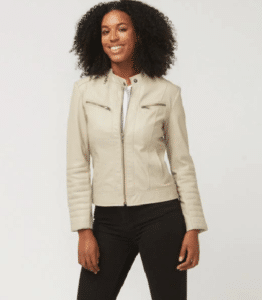
James and Co. [Staff tested]
Highlights: Classic leather jackets now available for pre-order in cactus lether, vegea (grape leather), Pinatex, and less toxic water-based polyurethane, with a recycled polyester lining. Made by an Australian B Corporation committed to sustainability.
James&Co. wants to change the look of ‘leather’ jackets in Australia (and beyond). This B Corporation offers gorgeous cruelty-free jackets made with more sustainable materials. These include cactus leather, vegea grape leather, Pinatex, and its own eco-leather water-based polyurethane, with recycled polyester linings.
James&Co. published its first Sustainability and Development Goals End of Year report for 2021, demonstrating its commitment to transparency and accountability. The company intends to become a Bluesign® partner, manufacturing materials in a safe way with minimal chemical inputs.
The responsiveness and ambition of this small company is impressive, with the CEO and founder, Anne Hurley quick to answer my questions and very transparent about materials and processes. She told me that James&Co. ditched traditional, harmful, polyurethane (PU) in 2018. Instead, James&Co. uses Water-based PU (WBPU) – a lab-grown alternative to PU. While WBPU isn’t biodegradable, it’s far less energy-intensive and toxic compared to regular PU.
Back in 2022, Anne also mentioned finding a “newly developed 100% sustainable synthetic leather”. It turns out this is MIRUM® 100% plantbased synthetic leather. Anne said in November, 2022, that “since connecting with them, I have stopped making [James&Co.] products in anything that includes polyurethane (PU) – be it traditional or including plants like cactus, pineapple etc. Whilst more sustainable, they are not biodegradable because they contain fossil fuels to some extent. And there is a fair amount of greenwashing that goes on about it.”
“We’re transitioning all leatherlook products to MIRUM as we can, handbags likely to be the first. The textile is not yet thin enough for apparel but we’ll be first brand off the rank. In the meantime, all sustainable fabrics replacing/additional – canvas, denim, hemp etc.”
Initially, James&Co. was a B2B company, but as of March 14th, the company pivots to sell directly to consumers. That means you can now pre-order its gorgeous jackets! Pre-order is part of the company’s business model because it avoids waste from overstock. Expect delivery to take 30-40 days from when you order.
James&Co. recently received a CO Sustainable Fashion Leadership 2022 award and will soon receive a Business Excellence award for pioneering sustainable vegan leather fashion. The company packs the jackets in a biodegradable non-woven bag with no plastic.
We love the Tiffany jacket from James&Co. It arrived in minimal packaging, just a polybag mailer (we do wish this were recycled paper or bioplastic) and a sheet of tissue paper. The jacket looked fantastic right out of the bag and didn’t smell terrible, unlike conventional polyurethane which will off-gas for days, weeks, or months.
The vegan leather is super soft and supple, the lining is a beautiful shimmery silvery grey, and you can really tell that this jacket was made with care and craftsmanship.
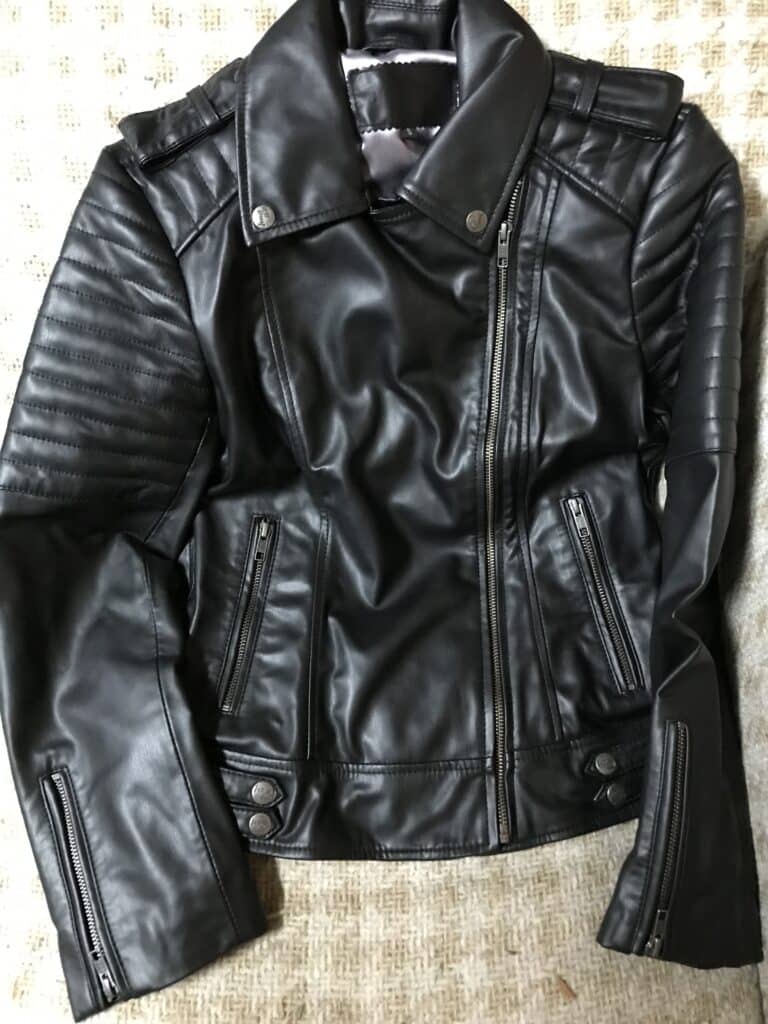
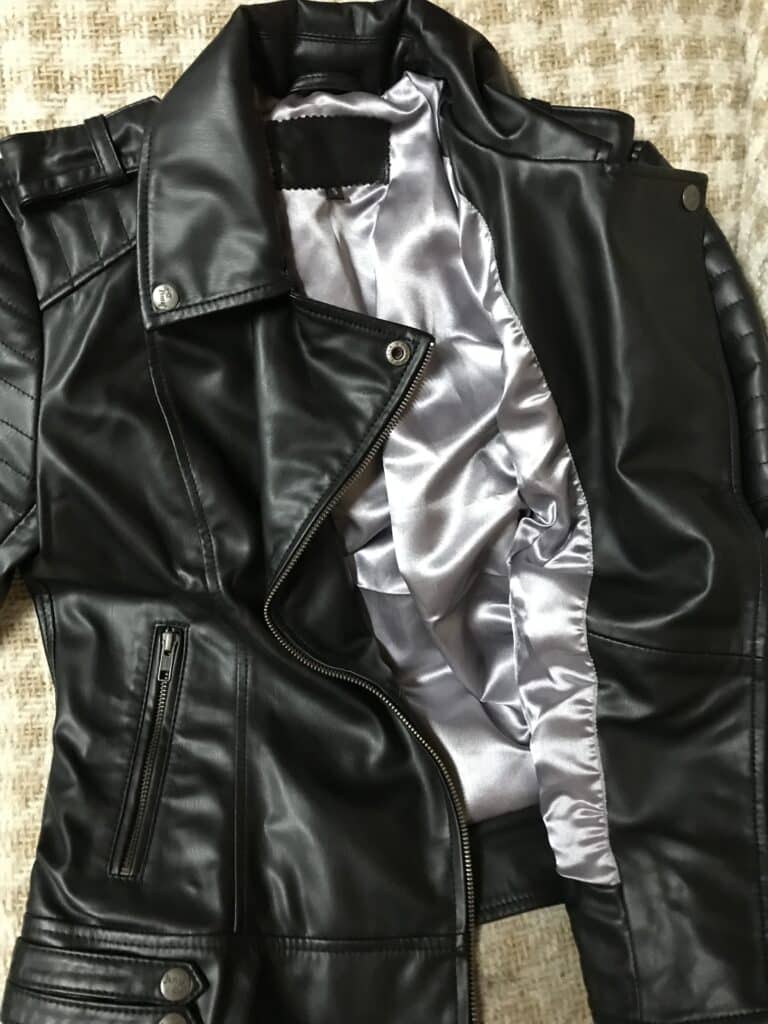
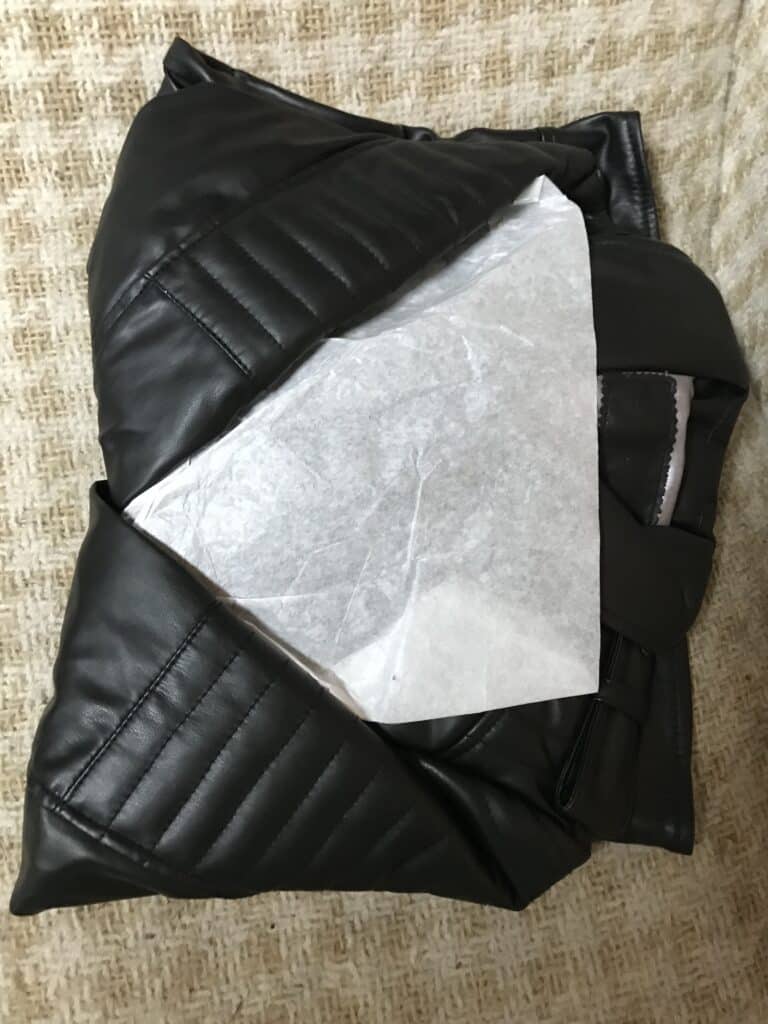
The Tiffany features a lot of zips and seams and snaps that look fantastic. With a lesser brand, all those intricate parts would worry me, given the potential for breakage. With James&Co. though, the jacket has held up through months of wear with no issues and nothing but comfort and style for our tester.
Sadly, this jacket didn’t fit me (5’6″, c130 lbs., size small-medium and curvy) as it was too small in the bust. Anne noted that the Small tends to run big, but a Medium would definitely have worked better for me. Our more petite and less curvy tester loves the Tiffany though!
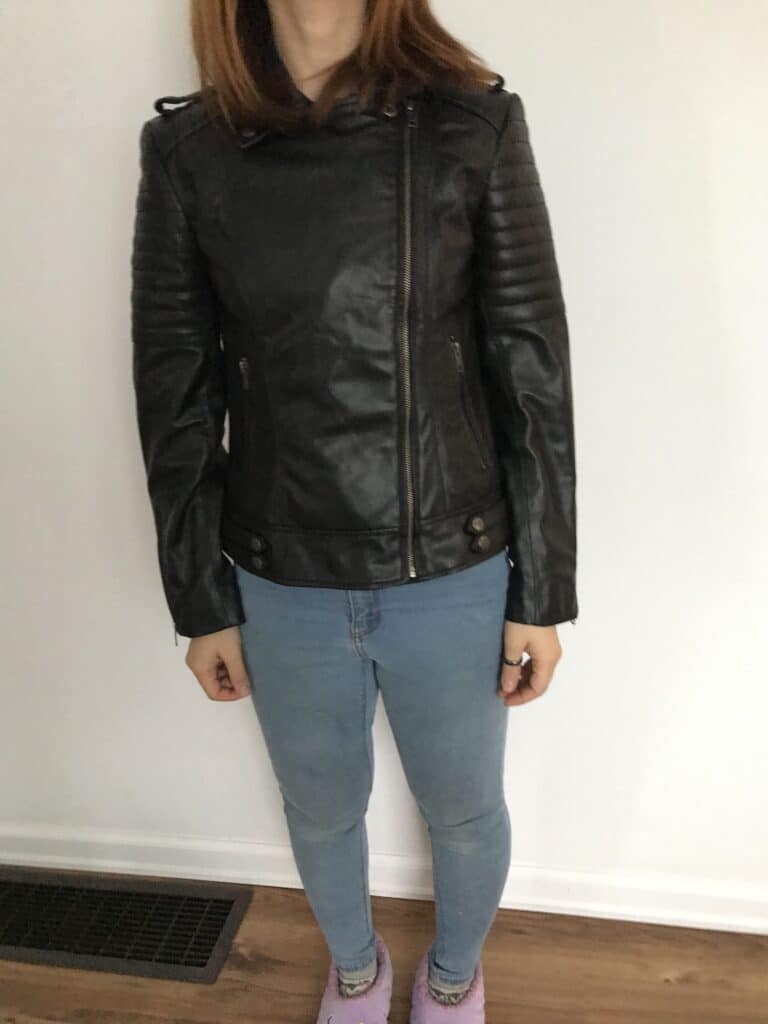
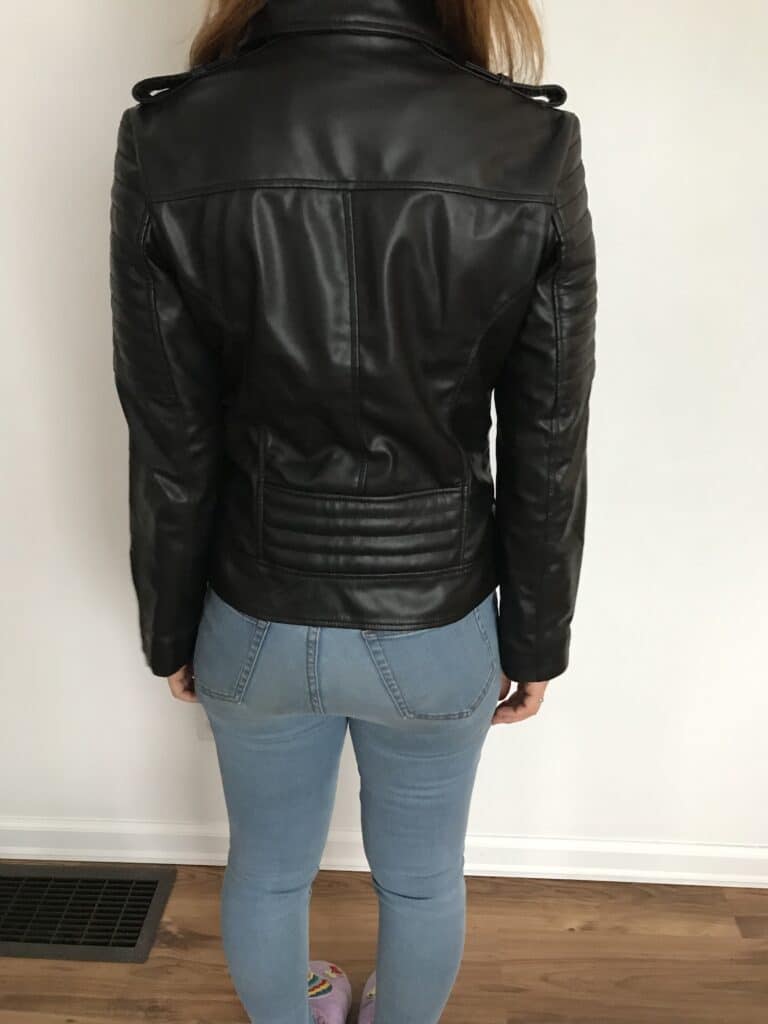
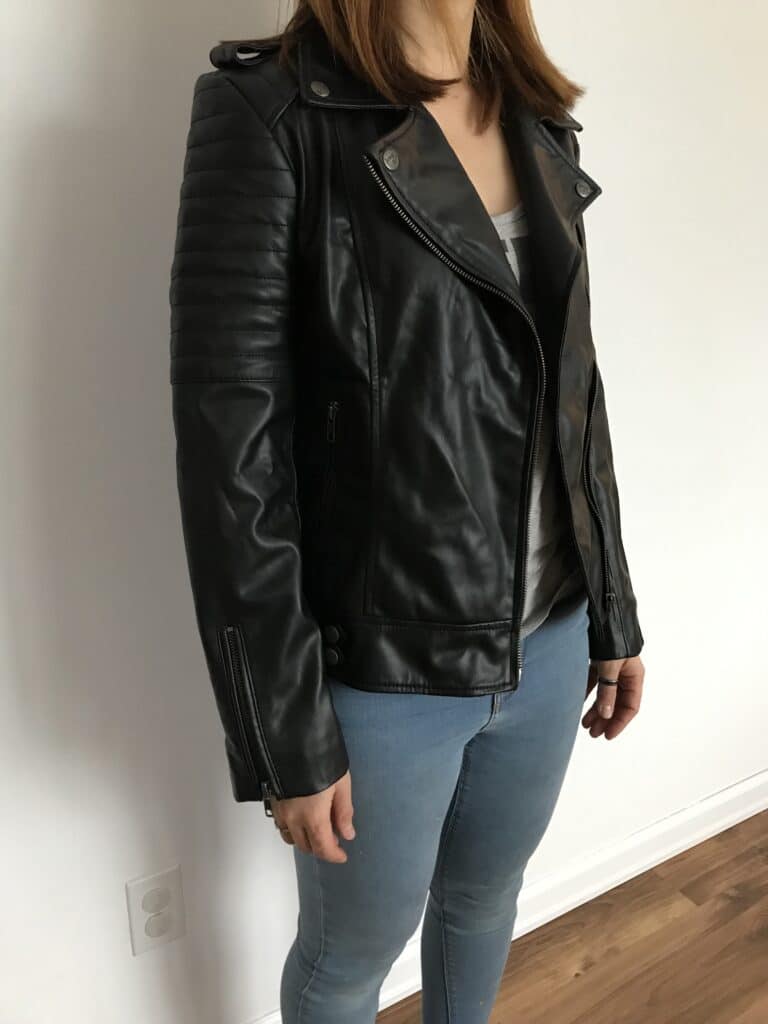
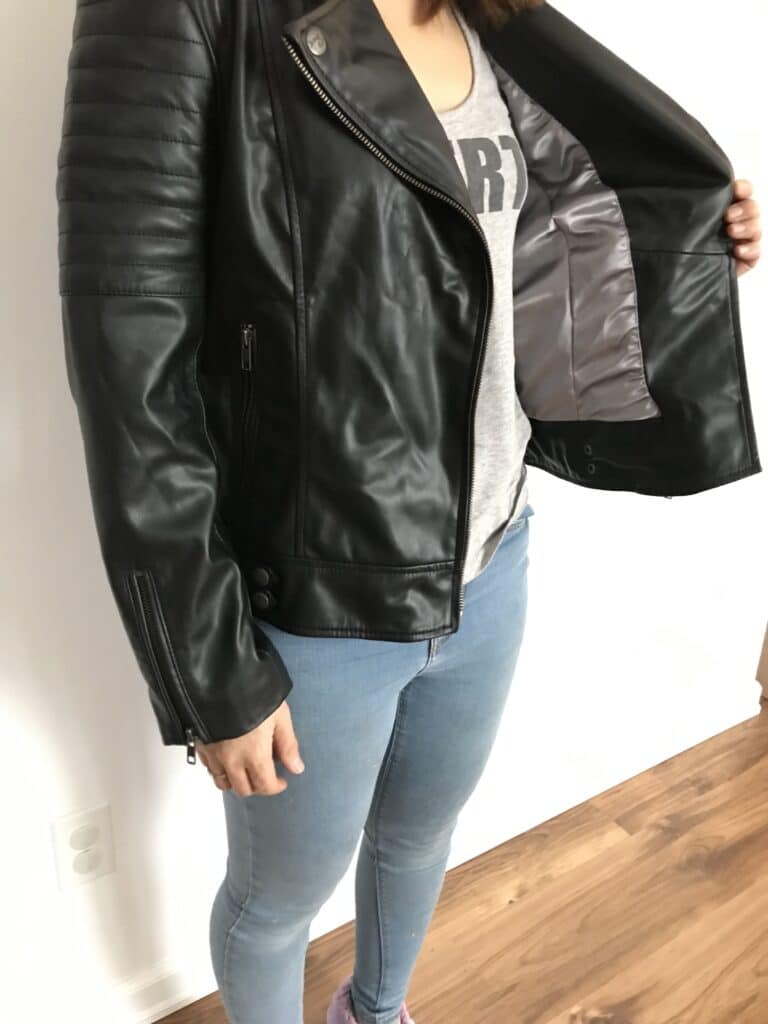

The branding is also really subtle on the Tiffany jacket. So subtle, in fact, that I struggled to take photos that show the company name, even in good light!
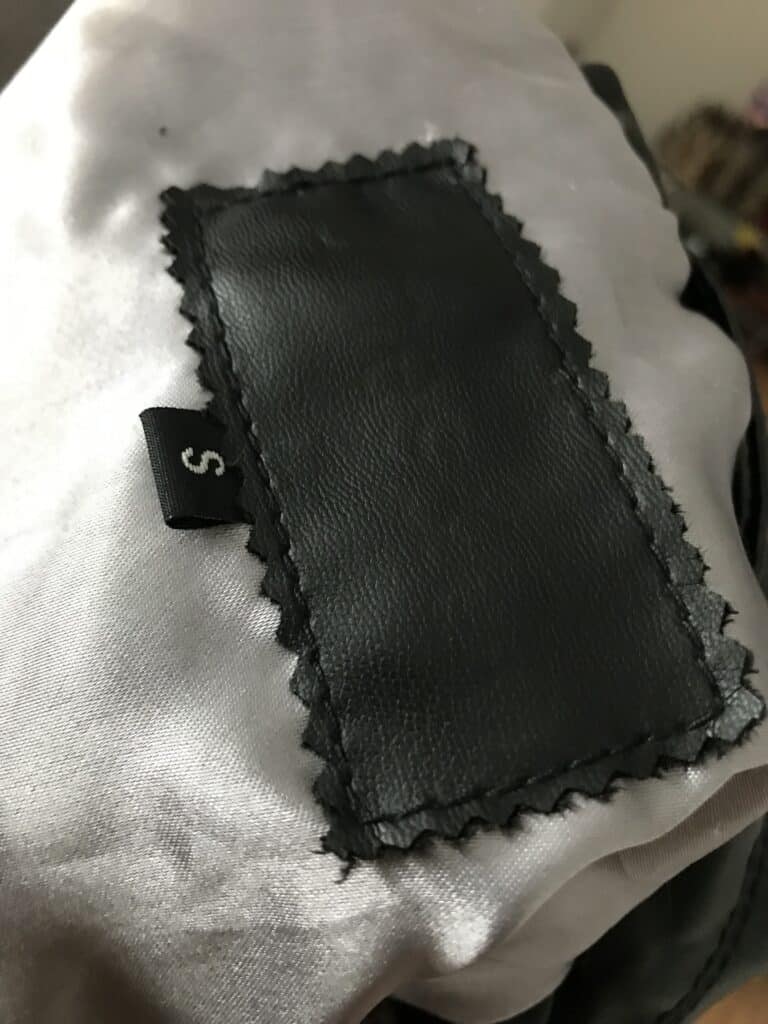
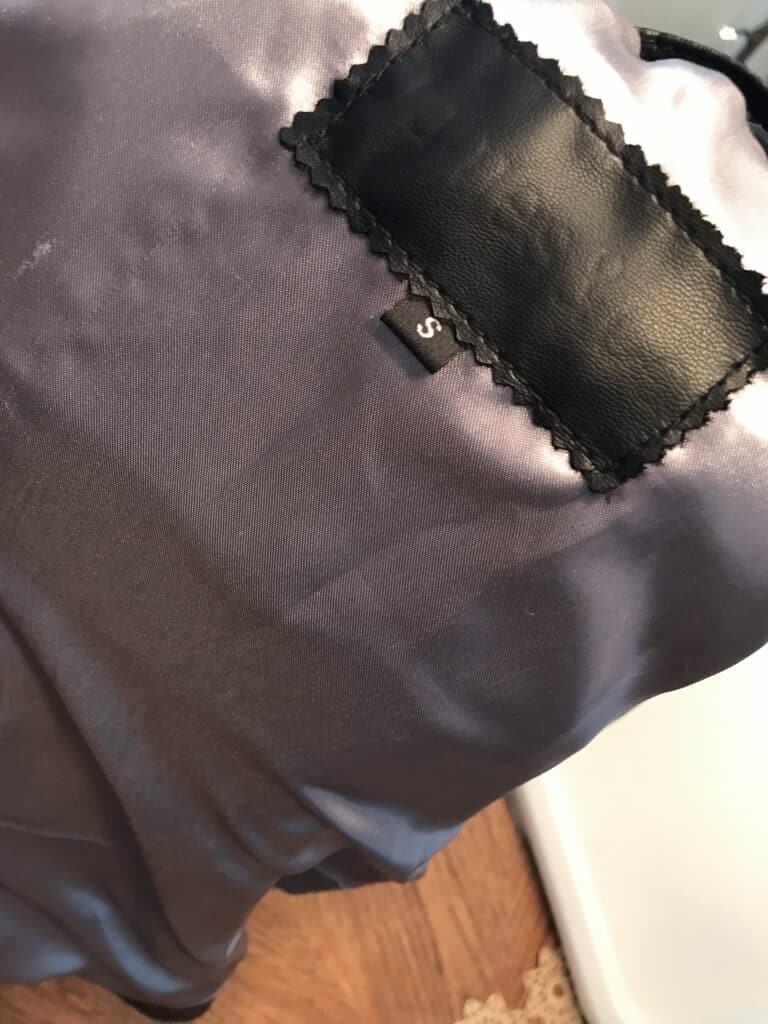
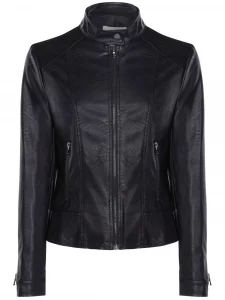
Will’s Vegan Store Vegan Racer Jacket
Highlights: WVS is a carbon-neutral company making sustainable vegan leather jackets free from PFCs and other toxic chemicals. The company uses OEKO-Tex 100 certified vegan leather and recycled materials.
Wills Vegan Store (WVS) has led the pack for vegan-friendly footwear since 2012, and the company also makes vegan leather jackets in small runs in Portugal and Italy using mostly eco-friendly vegan leather.
The company’s Vegan Racer Jacket is made from durable pebble grain, supple Italian vegan leather. It’s cut to sit on the hips, has collar and cuff snap fastenings, a sleeve zipper, and two zipped side pockets with cotton lining. The hardware is responsibly sourced and nickel-free. The jacket has a viscose lining.
The company’s vegan leather comprises polyurethane and bio-oil made from organic cereal crops grown in Europe. This vegan leather is certified OEKO Tex 100 and adheres to REACH regulations. It’s free from phthalates, PFCs, nanotechnology, and APEOs.
The current WVS vegan leather “contains 69% bio-oil and a viscose (a natural material from eucalyptus trees) backing fabric”. The rest (31%) of the leather is polyurethane, so it isn’t biodegradable. (WVS vegan suede comprises 100% polyurethane.) The company doesn’t use any PVC and uses compressed cardboard for clothing buttons.
WVS tries to source the majority of its materials from within Europe to minimize its environmental footprint. In 2021, the company opened a warehouse in the Netherlands to reduce shipping distances, resource use, and carbon footprint.
All WVS products are certified carbon-neutral and shipped carbon neutral in paper and cardboard packaging. In 2016, WVS became entirely carbon neutral and started shipping everything plastic-free. WVS even has a solar roof array on its Italian factory! WVS offers free returns for 365 days with a paperless carbon-neutral returns service.
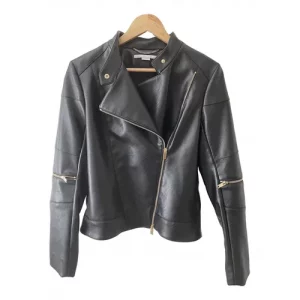
Stella McCartney (vintage)
Highlights: Designer brand and industry leader on sustainability and circular fashion. Offers vegan leather jackets (some contain wool) made with a variety of synthetic and natural materials. Choose vintage Stella McCartney for even greater sustainability!
Stella McCartney is a high-end designer brand making mostly animal-free clothing and footwear without leather, feathers, fur, or exotic skins. There is some wool in some Stella McCartney clothing though. At the time of writing, this vintage Stella McCartney vegan leather biker jacket caught my eye (view here).
Stella McCartney is a member of the Ethical Trading Initiative (ETI) which works to promote workers’ rights globally. The company has a robust Supplier Code of Conduct and is also industry-leading in terms of circular fashion. The brand has taken steps to reduce resource use throughout its operations and aims to recirculate, restore, regenerate, or recycle all materials, with no clothing or footwear ending up in landfills.
The company phased out all PVC in 2010 in favor of polyurethane and alternatives and avoids PFCs and azo dyes. Stella McCartney uses recycled or FSC certified packaging, switched all in-store lighting to LEDs, uses exclusively wind power to operate its UK locations, and purchases fittings and fixtures second-hand where possible, helping to reduce landfill waste.
The company still makes products with virgin polyurethane, but it is switching to waterborne and solvent-free polyurethanes that are less resource-intensive and safer for workers. In 2018, Stella McCartney made its first product using Mylo™, a vegan leather created from mycelium, the underground root structure of mushrooms. So far, the company has only made a bag, bustier, and pants using this material. I’m hopeful that Stella McCartney will unveil a mushroom leather jacket soon.
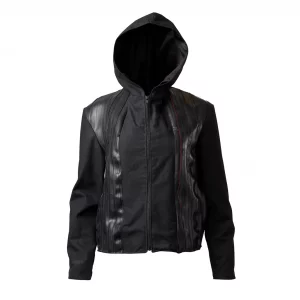
Malaika (New York) Bike Tube Jacket
Highlights: Zero-waste leather alternative jacket made in New York from recycled bike inner tubes and beeswax cotton (so not entirely vegan, but close!).
Malaika is a minimalist clothing brand based in New York and launched in 2016. The brand uses somewhat sustainably sourced materials to make (largely) zero waste clothing and accessories. The designs are contemporary and include many statement pieces, including the Bike Tube Jacket made from (surprise!) recycled rubber from locally sourced bike inner tubes.
Unfortunately, this hooded ‘leather’ jacket isn’t totally vegan. While Malaika describes it as a bike tube jacket, most of the fabric is beeswax cotton (which appears to be conventional rather than organic). It is zero-waste, though, and each jacket prevents 15-20 inner tubes from going to landfill. The jacket features a black tone zipper and customizable writing detail, with a different sized tube used for each jacket.
Malaika also offers one-of-a-kind jackets and other clothing items made by hand in New York from upcycled fabric scraps. Most items are available in sizes S-XL with some available in 2XL. The Bike Tube jacket is available in S/M, M/L, and L/XL.